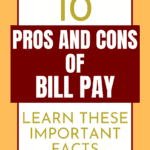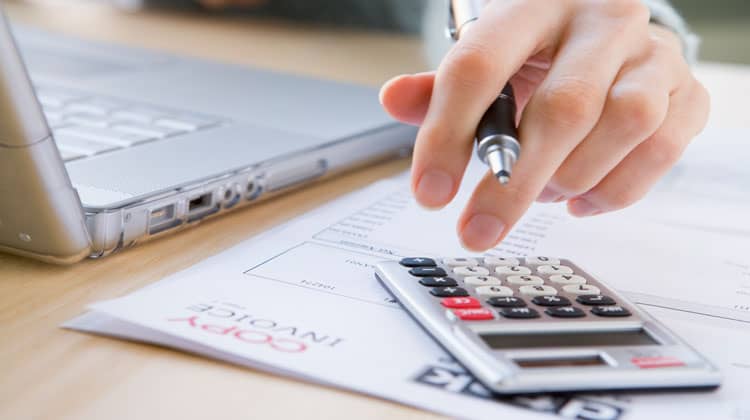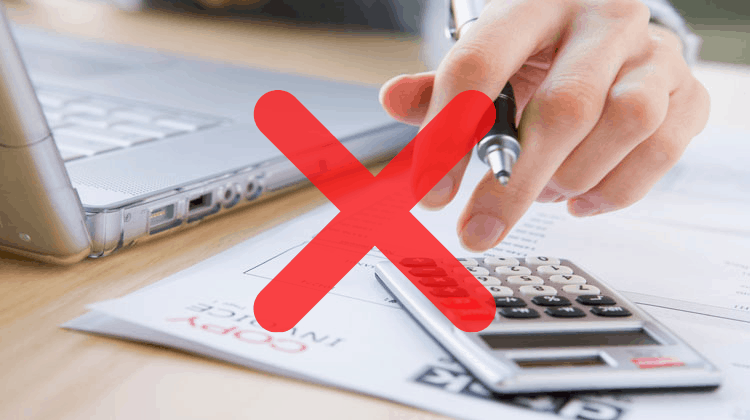THIS POST MAY CONTAIN AFFILIATE LINKS. PLEASE SEE MY DISCLOSURES. FOR MORE INFORMATION.
Online bill payment is an awesome benefit of technology.
Not only does making monthly payments online save you money, but it also saves you time.
But as great as automatic bill pay is, it is not perfect.
Before you decide to pay all your bills online, you need to get a complete picture of this service.
For this reason, I created the 10 pros and cons to bill pay you need to know.
You should weigh the benefits and drawbacks to make sure using this service makes sense for you.
Table of Contents
10 Important Pros And Cons Of Bill Pay
5 Pros Of Bill Pay
There are many benefits to bill pay.
Here are the ones that most people enjoy with this service.
#1. Saves Time
Hands down, the biggest advantage to bill pay is that it saves time.
You don’t have to write out a paper check, fill out the payment information on the bill itself, stuff the envelope, put a return address on the envelope, or walk the bill to the mailbox.
All you have to do is log into your bank account, either from your computer or mobile device, enter the payment details and you are done.
- Read now: Learn the pros and cons of online banking
- Read now: Find the perfect savings account for you
While the process of paying bills doesn’t take an entire weekend, it does take time every month to do.
With automatic bill pay, you get most of this time back.
#2. Saves Money On Stamps
Another benefit of bill pay is that you save money by not buying stamps.
While the cost of a book of stamps won’t bankrupt you, the cost does keep going up.
With a book of stamps costing $11, you are paying close to $100 a year in stamps for just your cell phone bill, electric bill, student loans, etc.
Add in any non recurring bills and your costs only increase.
Add in the inconvenience of going to buy the stamps and bill pay looks even better.
#3. More Secure Than Mailing A Check
Speaking of mailing in your bills, when you do mail in a check, it is not the most secure process.
You could have someone steal the mail from your mailbox, take the bank account information from your check, including your account numbers, and steal your identity.
Or, the bill could get lost in the mail and wind up in the hands of someone who might take advantage of your check.
Finally, the person processing your payment could be up to no good or even enter in the wrong information, causing you headaches down the road.
By avoiding paper bills in favor of online payments, you have the peace of mind knowing that your identity is at a lower risk of being compromised.
#4. Avoid Late Payments
When you automatically pay your bills online, you avoid late payment fees.
This is because you schedule when you want the bill to be paid.
When you don’t use bill pay, you have no idea when your mortgage company, local utility, or loan servicer will receive your payment.
You could mail out the payment weeks in advance and it still arrives late.
In fact, studies show that close to 20% of mail now arrives late.
If you mail 5 bills a month, that means every month, 1 bill could arrive after the payment due date.
#5. Improve Your Credit Score
The final advantage of online payments is it improves your credit score.
This is because you are more likely to pay your bills on time and paying on time accounts for 35% of your overall credit score.
Over time, you will see your credit score increase, saving you money by allowing you to get lower interest rate loans.
Additionally, since many employers and insurers use your credit score when making decisions, you could get lower insurance rates, saving you even more money, or get a better job.
5 Cons Of Bill Pay
As great as automatic bill pay is, there are downsides.
Here are the biggest drawbacks of bill pay.
#1. Bill Is Paid Even If You Don’t Have Sufficient Funds
When you schedule a bill to be paid from your bank account, the money is sent to pay the bill on the date indicated.
And the bill is paid regardless if you have $10,000 or $1 in your checking account.
As a result, you could end up paying overdraft fees to your bank if you don’t make sure you have enough money in your account to cover the bills.
- Read now: Learn what overdraft protection is
The same is true if you schedule automatic bill pay with your credit card or other service provider.
Another issue is if you have multiple payment dates in a short window.
It can be time consuming to make sure there is enough money in your account to cover the payments.
The bottom line is, if you plan to use the bill payment feature, you need to keep track of when bills will be sent out and that you have enough money in your bank account.
#2. Could Still Pay Late
While rare, you could sometimes end up paying late even when you use the automatic bill payment feature.
This is more of an issue when you initiate the payment from your financial institution and not your service provider.
Here is how this can work.
The due date for your bill is the 17th of the month. You schedule the bill to be paid on that date.
Even if your bank or credit union initiates the payment on the 17th, there could be an issue and your service provider doesn’t receive the bill until the 18th or 19th.
Suddenly, you are late with your payment and could end up paying late fees as a result.
Another issue to be aware of is when the due date falls.
Most automatic payments are sent on business days, not on weekends.
So if you have a bill due on a day that happens to be a weekend, you need to pay the bill the Friday before.
If you schedule payment on the weekend, it most likely won’t get sent out until Monday.
The solution here is to schedule your bills to be paid a few days before their due date.
#3. Hard To Lay Blame For Missed Payment
In the event a payment you make is late, it will take time to get the issue resolved.
Many times your bank and the service provider will blame each other for the issue.
As a result, it can be frustrating to get things sorted out.
The key is to remain calm and try to get your bank or service provider to work with you.
This could mean simply waiving the late fee.
In some cases, the payment might be missed because of you.
You might have put the bill in with a pile of mail that ended up getting shredded.
Or life got busy and you simply forgot.
In either case, the blame lies with you and you have to accept the consequences.
Understand that you can still work with merchants to get any fees removed, but you need to be honest and lay blame on yourself.
A worst case scenario is you scheduled the payment but for some reason, the bill pay service never sent the your payment.
This happened to me once and it was maddening.
I didn’t know if it was my fault or my bank’s fault.
Luckily I was able to get the late fee waived and it hasn’t happened since.
#4. Errors In Payment Amount
We’ve all seen the news headlines.
A person pays a bill online for $100 and suddenly they see their checking account is in the negative by $10,000 dollars.
What happened was the person entering the bill in the system transposed the numbers and you overpaid the amount due.
Or in some cases, they withdrew the money twice.
While these issues are rare, they do happen as humans are still part of the bill-paying process and make mistakes.
There is no avoiding this as you didn’t do anything wrong.
All you can do is reach out to the bank, service provider, or merchant and work with them in resolving the error.
#5. Don’t Notice Increasing Costs
The final drawback of online bill payments is if you set up automatic payment plans as a way to never worry about a bill again.
What I mean by this is, you sign up for paperless billing for your cable bill and then you never look at your monthly statement.
The issue here is over time, your bill will go up.
This is true for most bills.
By not reviewing your monthly bills, you run the risk of paying a lot more money than you otherwise would.
Let’s take the cable bill example again.
You set up to have your monthly bill automatically paid.
The bill comes to $175 a month.
But after January, the cable company raised rates, and there are new taxes and government fees.
Suddenly your $175 bill is now $215 a month and you have no idea.
Or worse, your promotion ended and you are now paying $300 for the same service.
As great as bill pay is, you need to still take time each month to review your bills.
Otherwise, you could end up paying a lot more for services.
Final Thoughts
At the end of the day, there are many pros and cons of bill pay.
For most people, the benefits far outweigh the risks and as a result, it is something you should consider doing.
But don’t make the mistake of putting electronic payments 100% on auto pilot.
You still need to review your bills and make sure you have the money in your account to cover the payment when they are due.
- Read now: Click here to learn how to lower your monthly expenses $1,000 a month
- Read now: Learn the pros and cons of multiple bank accounts
- Read now: See why so many people love banking with Capital One 360
I have over 15 years experience in the financial services industry and 20 years investing in the stock market. I have both my undergrad and graduate degrees in Finance, and am FINRA Series 65 licensed and have a Certificate in Financial Planning.
Visit my About Me page to learn more about me and why I am your trusted personal finance expert.




